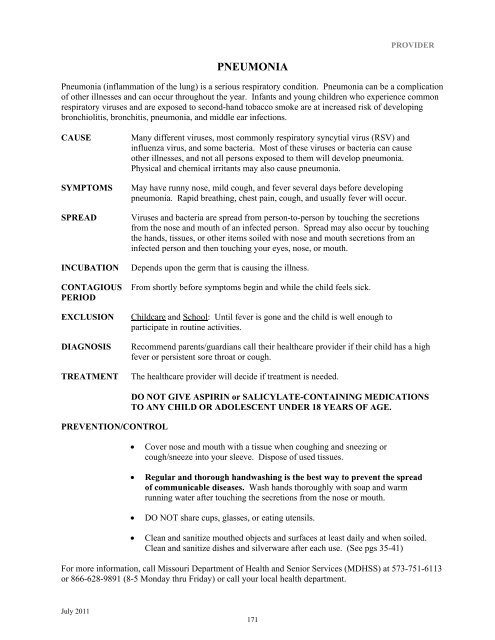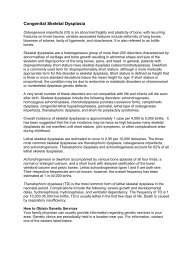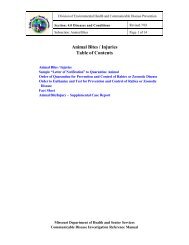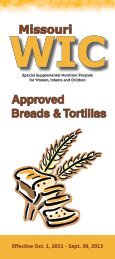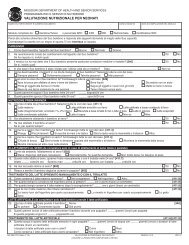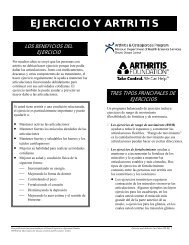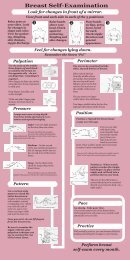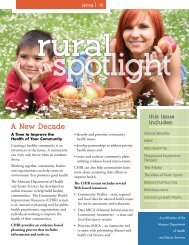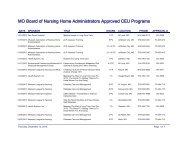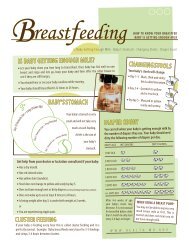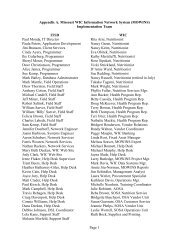Prevention and Control of Communicable Diseases - Missouri ...
Prevention and Control of Communicable Diseases - Missouri ...
Prevention and Control of Communicable Diseases - Missouri ...
You also want an ePaper? Increase the reach of your titles
YUMPU automatically turns print PDFs into web optimized ePapers that Google loves.
July 2011<br />
PNEUMONIA<br />
171<br />
PROVIDER<br />
Pneumonia (inflammation <strong>of</strong> the lung) is a serious respiratory condition. Pneumonia can be a complication<br />
<strong>of</strong> other illnesses <strong>and</strong> can occur throughout the year. Infants <strong>and</strong> young children who experience common<br />
respiratory viruses <strong>and</strong> are exposed to second-h<strong>and</strong> tobacco smoke are at increased risk <strong>of</strong> developing<br />
bronchiolitis, bronchitis, pneumonia, <strong>and</strong> middle ear infections.<br />
CAUSE Many different viruses, most commonly respiratory syncytial virus (RSV) <strong>and</strong><br />
influenza virus, <strong>and</strong> some bacteria. Most <strong>of</strong> these viruses or bacteria can cause<br />
other illnesses, <strong>and</strong> not all persons exposed to them will develop pneumonia.<br />
Physical <strong>and</strong> chemical irritants may also cause pneumonia.<br />
SYMPTOMS May have runny nose, mild cough, <strong>and</strong> fever several days before developing<br />
pneumonia. Rapid breathing, chest pain, cough, <strong>and</strong> usually fever will occur.<br />
SPREAD Viruses <strong>and</strong> bacteria are spread from person-to-person by touching the secretions<br />
from the nose <strong>and</strong> mouth <strong>of</strong> an infected person. Spread may also occur by touching<br />
the h<strong>and</strong>s, tissues, or other items soiled with nose <strong>and</strong> mouth secretions from an<br />
infected person <strong>and</strong> then touching your eyes, nose, or mouth.<br />
INCUBATION Depends upon the germ that is causing the illness.<br />
CONTAGIOUS<br />
PERIOD<br />
From shortly before symptoms begin <strong>and</strong> while the child feels sick.<br />
EXCLUSION Childcare <strong>and</strong> School: Until fever is gone <strong>and</strong> the child is well enough to<br />
participate in routine activities.<br />
DIAGNOSIS Recommend parents/guardians call their healthcare provider if their child has a high<br />
fever or persistent sore throat or cough.<br />
TREATMENT The healthcare provider will decide if treatment is needed.<br />
PREVENTION/CONTROL<br />
DO NOT GIVE ASPIRIN or SALICYLATE-CONTAINING MEDICATIONS<br />
TO ANY CHILD OR ADOLESCENT UNDER 18 YEARS OF AGE.<br />
� Cover nose <strong>and</strong> mouth with a tissue when coughing <strong>and</strong> sneezing or<br />
cough/sneeze into your sleeve. Dispose <strong>of</strong> used tissues.<br />
� Regular <strong>and</strong> thorough h<strong>and</strong>washing is the best way to prevent the spread<br />
<strong>of</strong> communicable diseases. Wash h<strong>and</strong>s thoroughly with soap <strong>and</strong> warm<br />
running water after touching the secretions from the nose or mouth.<br />
� DO NOT share cups, glasses, or eating utensils.<br />
� Clean <strong>and</strong> sanitize mouthed objects <strong>and</strong> surfaces at least daily <strong>and</strong> when soiled.<br />
Clean <strong>and</strong> sanitize dishes <strong>and</strong> silverware after each use. (See pgs 35-41)<br />
For more information, call <strong>Missouri</strong> Department <strong>of</strong> Health <strong>and</strong> Senior Services (MDHSS) at 573-751-6113<br />
or 866-628-9891 (8-5 Monday thru Friday) or call your local health department.


